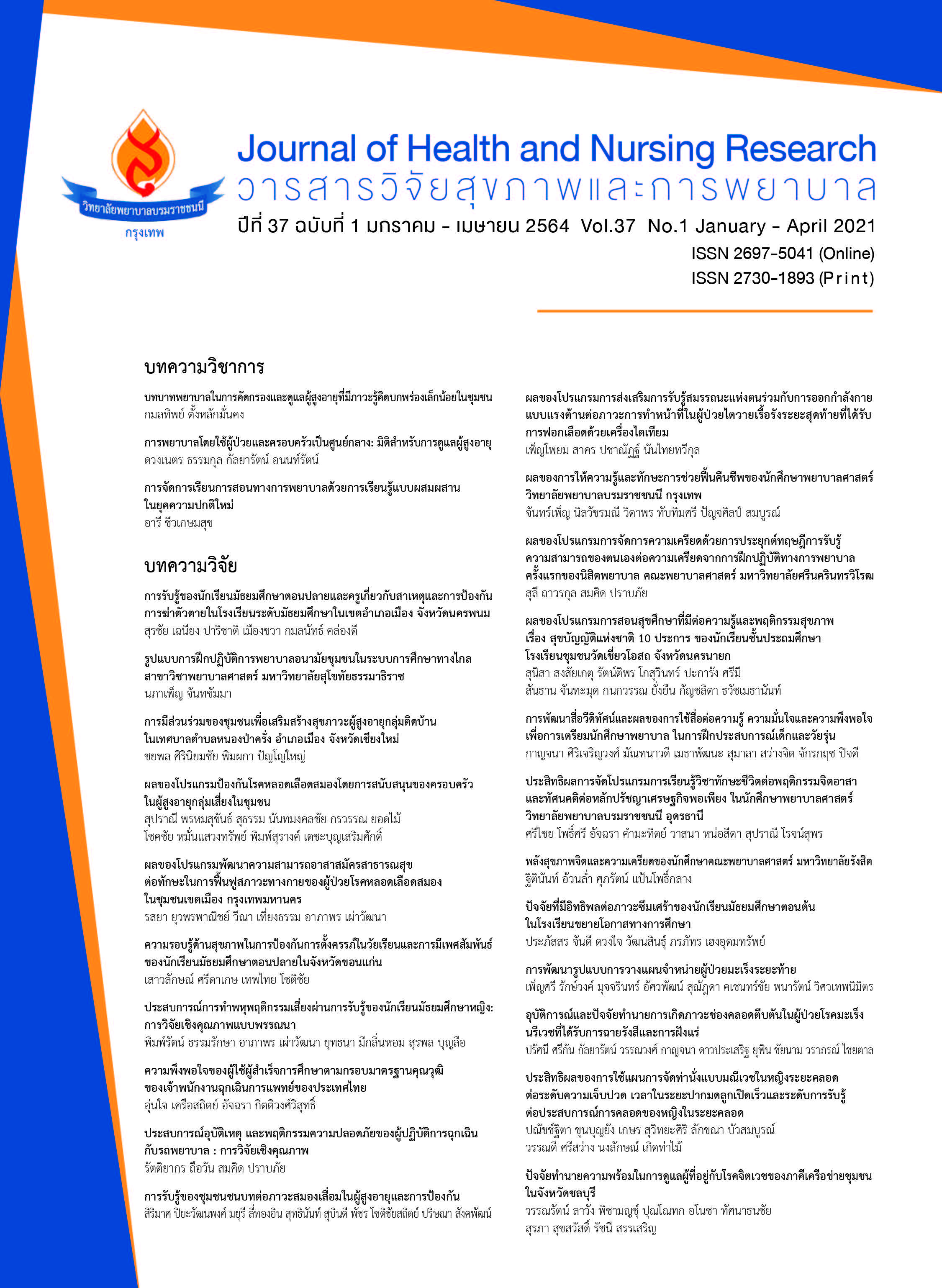พลังสุขภาพจิตและความเครียดของนักศึกษาคณะพยาบาลศาสตร์ มหาวิทยาลัยรังสิต
คำสำคัญ:
พลังสุขภาพจิต, ความเครียด, นักศึกษาพยาบาลบทคัดย่อ
บทนำ: พลังสุขภาพจิตช่วยให้บุคคลที่มีภาวะเครียดสามารถเผชิญปัญหาและอุปสรรคในชีวิตได้อย่างมีประสิทธิภาพและป้องกันผลกระทบที่เกิดต่อร่างกายและจิตใจตั้งแต่ระดับเล็กน้อยถึงอันตรายรุนแรงต่อชีวิต วัตถุประสงค์การวิจัย: เพื่อเปรียบเทียบและหาความสัมพันธ์ระหว่างพลังสุขภาพจิตและความเครียดของนักศึกษาคณะพยาบาลศาสตร์ มหาวิทยาลัยรังสิต ระเบียบวิธีวิจัย: กลุ่มตัวอย่าง คือ นักศึกษาพยาบาลชั้นปีที่ 2-4 หลักสูตรพยาบาลศาสตรบัณฑิต คณะพยาบาลศาสตร์ มหาวิทยาลัยรังสิต ปีการศึกษา 2562 จำนวน 272 คน เครื่องมือที่ใช้ประกอบด้วยแบบสอบถามข้อมูลส่วนบุคคล แบบประเมินพลังสุขภาพจิต และแบบประเมินความเครียดสวนปรุง แบบสอบถามมีค่าสัมประสิทธิ์แอลฟาของครอนบาค เท่ากับ .84 และ .95 ตามลำดับ วิเคราะห์ข้อมูลด้วยสถิติเชิงพรรณนา สถิติการวิเคราะห์ความแปรปรวนแบบทางเดียว และสถิติสัมประสิทธิ์สหสัมพันธ์ของเพียร์สัน ผลการวิจัย: ผลการศึกษาพบว่านักศึกษาพยาบาลมีพลังสุขภาพจิตอยู่ระดับปกติ (Mean = 63.84, SD. = 7.39) และร้อยละ 38.97 มีความเครียดอยู่ระดับปานกลาง นักศึกษาพยาบาลที่มีปัจจัยส่วนบุคคล ด้านเพศ ผลสัมฤทธิ์ทางการเรียน และลักษณะครอบครัวที่ต่างกัน มีพลังสุขภาพจิตและความเครียดไม่แตกต่างกัน ส่วนอายุ ระดับชั้นปีที่ศึกษา บรรยากาศในครอบครัว และสถานะทางการเงินที่ต่างกัน มีพลังสุขภาพจิตและความเครียดแตกต่างกันอย่างมีนัยสำคัญทางสถิติ (p<.05) และพลังสุขภาพจิตมีความสัมพันธ์ทางลบกับความเครียด (r= -.473, p<.001) สรุปผล: พลังสุขภาพจิตช่วยให้นักศึกษาพยาบาลจัดการกับเหตุการณ์ที่ก่อให้เกิดความยุ่งยากได้อย่างมีประสิทธิภาพ สามารถเผชิญปัญหาได้ดียิ่งขึ้น มีความเครียดลดลง ข้อเสนอแนะ: ควรมีการจัดกิจกรรมส่งเสริมพลังสุขภาพจิตของนักศึกษาควบคู่ไปกับการฝึกทักษะการจัดการกับความเครียดให้สอดคล้องกับบริบทของนักศึกษาพยาบาล
Downloads
เอกสารอ้างอิง
Campbell-Sills L, Forde DR, Stein MB. Demographic and childhood environmental predictors of resilience in a community sample. Journal of Psychiatric Research 2009;43:1007-12.
Bowes L, Maughan B, Caspi A, Moffitt TE, Arseneault L. Families promote emotional and behavioral resilience to bullying: evidence of an environmental effect. Journal of Child Psychology and Psychiatry 2010;51:809-17.
Wachiradilok P. Predictive factors of resilience quotient of nursing students in Suandusit Rajabhat University. The Journal of Psychiatric Nursing and Mental Health 2014;28(2):17-31. (in Thai).
Tantalanukul S, Wongsawat P. Stress and stress management in nursing students. Boromarajonani College of Nursing, Uttaradit Journal 2017;9(1):81-92. (in Thai).
Grotberg EH. A Guide for promotion resilience in children: strengthening the human spirit. The Bernard van Leer Foundation: The Hague; 1995.
Kanjanaratanakorn K. Sample size determination. Chiang Mai: Faculty of Medicine, Chiang Mai University; 2013. (In Thai).
Nintachan P, Thaweekoon T, Wittayasooporn J, Orathai P. Resilience and stress among nursing students at Ramathibodi School of Nursing. The Journal of Psychiatric Nursing and Mental Health 2011;25(1):1-13. (in Thai).
Thaweekoon T, Nintachan P, Sangon S. Factors predicting stress in graduate nursing students nursing. Journal of the Ministry of Public Health 2013;22(3):1-11. (in Thai).
Nintachan P, Sangon S, Thaweekoon, T. A resilience enhancing program. Bangkok: Chudtong; 2012. (in Thai).
Wongkhan M, Nintachan P, Sangon S. Factors related to resilience in adolescents. The Journal of Psychiatric Nursing and Mental Health 2015;29(1):57-75. (in Thai).
Kaewsakulthong J. Factors predicting stress among nursing students under the Praboromarajchanok Institute, Ministry of Public Health. Journal of Health Research and Innovation 2019;2(1):1-11. (in Thai).
Huurre T, Eerola M, Rahkonen O, Aro H. Does social support affect the relationship between socioeconomic status and depression? A longitudinal study from adolescence to adulthood. Journal of affective disorder 2007;100(1):55-64.
Nasreen HE, Alam MA, Edhborg M. Prevalence and associated factors of depressive symptoms among disadvantaged adolescents: results from a population-based study in Bangladesh. Journal Child adolescence Psychiatric Nursing 2016;29(3):135-44.
Feinstein L, Hammond C. The contribution of adult learning to health and social capital. Oxford Review of Education 2004;30:199-221.
Chaiyavichit S. Influencing factors of stress and stress coping among nursing students of Phrapokklao nursing college, Chanthaburi. Journal of Phrapokklao Nursing College 2009;20(2):49-58. (in Thai).
Juntapim S, Sungworawongpana T, Boontoch K, Sriraksa A, Kanchanabat B. The 4th year nursing students opinions towards the teaching and learning of the faculty of nursing, Khon Kaen University. Journal of Nursing Science & Health 2019;42(4):102-11. (in Thai).
Grotberg EH. Resilience for today: gaining strength from adversities. Con-necticut: Praeger
Publishers; 2003.
ดาวน์โหลด
เผยแพร่แล้ว
รูปแบบการอ้างอิง
ฉบับ
ประเภทบทความ
สัญญาอนุญาต
บทความที่ได้รับการตีพิมพ์ เป็นลิขสิทธิ์ของวารสารวิจัยสุขภาพและการพยาบาล (วิทยาลัยพยาบาลบรมราชชนนี กรุงเทพ) ไม่สามารถนำไปตีพิมพ์ซ้ำในวารสารฉบับอื่น


















